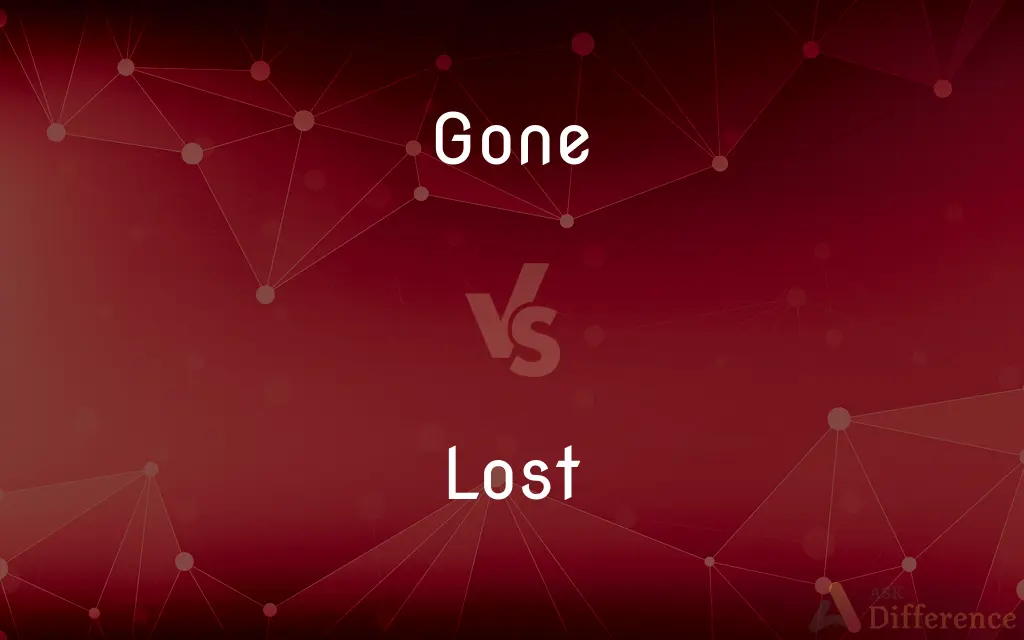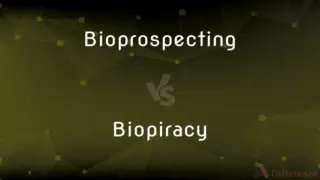Gone vs. Lost — What's the Difference?
By Maham Liaqat & Urooj Arif — Updated on April 1, 2024
Gone emphasizes the state of absence, suggesting something has departed from its place, while lost focuses on the inability to find something, indicating it is misplaced or missing.

Difference Between Gone and Lost
Table of Contents
ADVERTISEMENT
Key Differences
Gone primarily denotes that something or someone has left a place or ceased to exist, emphasizing the state of absence. For instance, when we say a person is gone, it often implies they have departed or passed away. Whereas lost emphasizes a lack of location or direction, often suggesting that an item cannot be found or a person is disoriented. It conveys a sense of misplacement or the inability to locate something.
Gone is often used in a broader, sometimes more final context. It can indicate that something is no longer available or in existence, such as a time period or opportunity. This usage implies a permanent state from which return or recovery is not expected. On the other hand, lost can imply a temporary state, holding the possibility that the person or item may be found or recovered. For example, a lost item might be misplaced but recoverable.
In terms of emotional or abstract use, gone can describe feelings or conditions that have disappeared or ended. It might express that love or hope is gone, indicating it has vanished or ceased to exist in its previous form. Lost, however, can describe feelings of confusion, aimlessness, or lacking. When someone feels lost, it can imply a search for direction, purpose, or clarity, not just physical misplacement.
Gone can also indicate completion or passing, such as in "the party is gone," which suggests that the event has concluded. This aspect of being gone carries a sense of completion or finality. Lost, in a different vein, can refer to opportunities or chances that have been missed, implying that they are gone due to oversight or failure, rather than just the passage of time.
The use of gone and lost in expressions and idioms also reflects their distinct nuances. Phrases like "gone fishing" imply a deliberate absence for a specific reason, while "lost in thought" suggests an unintentional diversion of attention or focus.
ADVERTISEMENT
Comparison Chart
Definition
Indicates something has departed, is no longer present, or ceased to exist.
Indicates something cannot be found or is missing.
Usage in Context
Often used to describe something or someone that has permanently left or vanished.
More commonly used when something is misplaced or a person is disoriented.
Emotional Connotation
Can imply a finality or completeness, such as a feeling or opportunity that has fully disappeared.
Often implies a temporary state, with the possibility of recovery or rediscovery.
Examples in Phrases
"Gone with the wind," "long gone."
"Lost and found," "get lost."
Abstract Use
Can describe an absolute state of absence in feelings or abstract concepts.
Can suggest confusion, aimlessness, or a search for something missing.
Compare with Definitions
Gone
Depleted or used up.
The food is gone; it's time to go grocery shopping.
Lost
Unable to find one's way.
We got lost on our way to the hotel.
Gone
Absent from a place.
He is gone for the day, expected to return tomorrow.
Lost
To no longer have because of carelessness.
She lost her phone at the park.
Gone
Having departed.
She's gone to Europe for a month-long vacation.
Lost
Misplaced.
I've lost my keys somewhere in the house.
Gone
No longer available.
The tickets are gone; we'll have to find another event.
Lost
Not won.
The team has lost the championship this year.
Gone
Past participle of go1.
Lost
Lacking comprehension or direction.
He looks lost in advanced calculus class.
Gone
Being away from a place; absent or having departed.
Lost
Past tense and past participle of lose.
Gone
Missing or lost
My watch is gone.
Lost
Unable to find one's way
A lost child.
Gone
No longer in existence; not part of the present
"The biggest catastrophe was the lack of wildlife. The great herds were gone" (Tom Clynes).
Lost
No longer in the possession, care, or control of someone or something
A lost pen.
Gone
No longer available; used up
All the rice is gone.
Lost
No longer in existence; vanished or spent
Lost youth.
Gone
Past; bygone
An era long gone.
Lost
No longer known or practiced
A lost art.
Gone
Advanced, as in illness or deterioration
"My poor father was far gone in a decline that took him off" (Robert Louis Stevenson).
Lost
Beyond reach, communication, or influence
The expedition was lost to the world for two months.
Gone
Ruined; lost
A gone cause.
Lost
Not used to one's benefit or advantage
A lost opportunity.
Gone
Carried away; absorbed
Far gone in speculation.
Lost
Having not been or unlikely to be won; unsuccessful
A lost battle.
A lost cause.
Gone
(Slang) Infatuated
Gone on his sweetheart.
Lost
Beyond recovery or redemption; fallen or destroyed
A lost soul.
Gone
(Slang) Pregnant
Is five months gone.
Lost
Completely involved or absorbed; rapt
Lost in thought.
Gone
Inflection of go
Lost
Bewildered or confused
I'm lost—can you start over?.
Gone
Alternative spelling of gonor gon': short for gonna, going to.
Lost
Simple past tense and past participle of lose
Gone
Away, having left.
Are they gone already?
Lost
Having wandered from, or unable to find, the way.
The children were soon lost in the forest.
Gone
No longer existing, having passed.
The days of my youth are gone.
All the little shops that used to be here are now gone.
Lost
In an unknown location; unable to be found.
Deep beneath the ocean, the Titanic was lost to the world.
Gone
Used up.
I'm afraid all the coffee's gone at the moment.
The bulb's gone, can you put a new one in?.
Lost
Not perceptible to the senses; no longer visible.
An island lost in a fog; a person lost in a crowd
Gone
Doomed, done for.
Have you seen the company's revenue? It's through the floor. They're gone.
Lost
Parted with; no longer held or possessed.
A lost limb; lost honour
Gone
(colloquial) Not fully aware of one's surroundings, often through intoxication or mental decline.
Don't bother trying to understand what Grandma says; she's gone.
Lost
Not employed or enjoyed; thrown away; employed ineffectually; wasted; squandered.
A lost day; a lost opportunity or benefit; no time should be lost
Gone
(slang) Entirely given up to; infatuated with; used with on.
He's totally gone on her.
Lost
Ruined or destroyed, either physically or morally; past help or hope.
A ship lost at sea; a woman lost to virtue; a lost soul
Gone
Excellent, wonderful; crazy.
It was a group of real gone cats.
Lost
Hardened beyond sensibility or recovery; alienated; insensible.
Lost to shame; lost to all sense of honour
Gone
(archaic) Ago (used post-positionally).
Lost
Occupied with, or under the influence of, something, so as not to notice external things.
To be lost in thought
Gone
(US) Weak; faint; feeling a sense of goneness.
Lost
Parted with unwillingly or unintentionally; not to be found; missing; as, a lost book or sheep.
Gone
Of an arrow: wide of the mark.
Lost
Parted with; no longer held or possessed; as, a lost limb; lost honor.
Gone
Used with a genitively constructed duration to indicate for how long a process has been developing, an action has been performed or a state has persisted; pregnant.
She’s three months' gone
Lost
Not employed or enjoyed; thrown away; employed ineffectually; wasted; squandered; as, a lost day; a lost opportunity or benefit.
Gone
Past, after, later than (a time).
You'd better hurry up, it's gone four o'clock.
Lost
Having wandered from, or unable to find, the way; bewildered; perplexed; as, a child lost in the woods; a stranger lost in London.
Gone
Not present; having left;
He's away right now
You must not allow a stranger into the house when your mother is away
Everyone is gone now
The departed guests
Lost
Ruined or destroyed, either physically or morally; past help or hope; as, a ship lost at sea; a woman lost to virtue; a lost soul.
Gone
Having all been spent;
The money is all gone
Lost
Hardened beyond sensibility or recovery; alienated; insensible; as, lost to shame; lost to all sense of honor.
Gone
Well in the past; former;
Bygone days
Dreams of foregone times
Sweet memories of gone summers
Relics of a departed era
Lost
Not perceptible to the senses; no longer visible; as, an island lost in a fog; a person lost in a crowd.
Gone
No longer retained;
Gone with the wind
Lost
Occupied with, or under the influence of, something, so as to be insensible of external things; as, to be lost in thought.
Lost
People who are destined to die soon;
The agony of the doomed was in his voice
Lost
No longer in your possession or control; unable to be found or recovered;
A lost child
Lost friends
His lost book
Lost opportunities
Lost
Having lost your bearings; confused as to time or place or personal identity;
I frequently find myself disoriented when I come up out of the subway
The anesthetic left her completely disoriented
Lost
Spiritually or physically doomed or destroyed;
Lost souls
A lost generation
A lost ship
The lost platoon
Lost
Not gained or won;
A lost battle
A lost prize
Lost
Incapable of being recovered or regained;
His lost honor
Lost
Not caught with the senses or the mind;
Words lost in the din
Lost
Deeply absorbed in thought;
As distant and bemused as a professor listening to the prattling of his freshman class
Lost in thought
A preoccupied frown
Lost
No longer known; irretrievable;
A forgotten art
A lost art
Lost civilizations
Lost
Perplexed by many conflicting situations or statements; filled with bewilderment;
Obviously bemused by his questions
Bewildered and confused
A cloudy and confounded philosopher
Just a mixed-up kid
She felt lost on the first day of school
Lost
Unable to function; without help
Common Curiosities
Can lost items be recovered?
Frequently, yes, especially if they are simply misplaced.
How do "gone fishing" and "lost at sea" differ in meaning?
"Gone fishing" implies a deliberate absence for leisure, whereas "lost at sea" suggests an unintended and potentially perilous situation.
Can a person be lost?
Yes, either physically (unable to find their way) or emotionally (feeling aimless or confused).
What does it mean when something is gone?
It means it has left, disappeared, or ceased to exist.
Can you feel both gone and lost?
Yes, someone can feel gone in the sense of disconnected or absent, and lost in terms of confusion or aimlessness simultaneously.
Is being lost always a negative state?
Not necessarily; it can also lead to self-discovery or new experiences.
Is it possible to recover from a lost opportunity?
Yes, by finding or creating new opportunities.
Is something gone permanently?
Often, yes, especially when referring to opportunities or deceased individuals.
Can a place be gone?
Yes, if it has been destroyed or fundamentally changed, making it unrecognizable.
What does it mean if hope is gone?
It suggests that hope has completely disappeared or ceased to exist.
What does "time is gone" imply?
It means that a certain period has passed or an opportunity has elapsed.
How can someone deal with the feeling of being lost?
By seeking guidance, reflecting on personal goals, or exploring new directions.
What is the emotional impact of something being gone?
It can lead to feelings of loss, nostalgia, or finality.
How does one find something lost?
Through searching, either physically for objects or introspectively for abstract concepts like purpose.
What does "lost in translation" mean?
It refers to the misinterpretation or miscommunication of meaning when converting from one language to another.
Share Your Discovery

Previous Comparison
Cathedral vs. Dome
Next Comparison
Bioprospecting vs. BiopiracyAuthor Spotlight
Written by
Maham LiaqatCo-written by
Urooj ArifUrooj is a skilled content writer at Ask Difference, known for her exceptional ability to simplify complex topics into engaging and informative content. With a passion for research and a flair for clear, concise writing, she consistently delivers articles that resonate with our diverse audience.















































